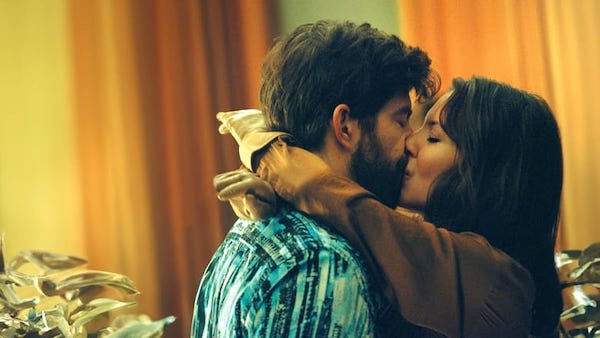Film Review: “The Nature of Love” — Revamping the Rom-Com
By Steve Erickson
Director Monia Chokri finds a language for communicating Sophia’s desire without putting her body on display.
The Nature of Love, directed by Monia Chokri. Screening on July 27 at 1 p.m. at the MFA’s Boston French Film Festival.

Pierre-Yves Cardinal and Magalie Lépine-Blondeau in a scene from The Nature of Love.
Sylvain (Pierre-Yves Cardinal) and Sophia (Magalie Lépine-Blondeau) are types. She’s a professor who lectures her class in Montreal about the idea of love in Plato, Spinoza, and bell hooks.. At home, she lives in a comfortable but unexciting marriage to her husband Xavier (Francis-William Rhéaume). It might be a sign of modernity that they sleep in separate beds, but it also suggests Hays Code-era conservatism. When she meets Sylvain, who’s renovating her country home, the two quickly embark on bouts of hot sex. Sylvain comes from a family where he’s considered an intellectual because he is interested in UFOs and the possibility of life after death. He teaches Sophia to shoot a rifle. The more time they spend together, the question of whether there’s anything to their relationship beyond sexual attraction becomes more urgent — and ambiguous.
Although it’s receiving its Boston premiere in the MFA’s French film festival, The Nature of Love was made in Quebec (albeit with substantial production money from France). Despite the romance’s accessibility, it’s receiving a very minimal release in the U.S. Perhaps that is because its early scenes feel like a typical French comedy about intellectuals cheating on each other. Chokri nails the tone of a dinner party in which the climate crisis is just another topic for pleasant conversation — it has no more weight than banter about a Damien Hirst exhibit. The men’s physical differences are set in balanced contrast. Xavier sports a thin, neatly trimmed beard; Sylvain’s extends down to his neck. Sylvain’s bearish physicality and frank talk excite the cerebral Sophia. Still, by the time she invites him to have sex with her while she wears a leash, there’s a suggestion that Sylvian is only a means to fulfill her fantasies. His realization that “I’ll fuck you, since that’s why you like me” is typically direct. It also comes off as a bit weary.
The fact that The Nature of Love is French-Canadian makes itself felt in its visual and cultural reference points. The landscape is snowy, with lakes and forests. Sylvain is a fan of French pop singer Michel Sardou and quotes one of his lyrics to Sophia. (I needed to look Sardou up on Wikipedia to learn who he is as well as get the lowdown on the controversies triggered by his music’s contradictory politics.) The cultural differences between Sylvain and Sophia’s families and friends extend to politics, but not nearly to the extent they would in a similar clash-of-milieus film set in the U.S. At a party, Sylvian stumbles from “why are Arabs demonized as violent when everyone I’ve met is so nice?” to “sometimes, the death penalty is justified” in less than a minute. His awkwardness comes off as genuine. Sylvain’s attitude to women — he is upfront about his sexual desires while he treats them respectfully — underlines this sympathetic treatment. The film’s self-congratulatory intelligentsia, analyzing the use of quarter tones and intervals in Arabic music, is seen more scathingly.
Chokri finds a language for communicating Sophia’s desire without putting her body on display. The Nature of Love is very frank about its characters’ horniness. Puritans would not approve of the film’s plot or dialogue, but its sex scenes are far from explicit. The only nudity is a brief glimpse of Sylvain’s butt. In the lovemaking scenes, Chokri settles on Sophia’s face, rather than the rest of her body. When she masturbates in the shower, we are given flashbacks to exciting physical moments with Sylvain. In interviews, Chokri has confessed that “{sex scenes in film} never really interested me…everyone’s perspective is shaped by the male gaze.” The Nature of Love shows a woman enjoying her body — without showing her off to the audience. For instance, Sophia gazes at her own image in mirrors and windows.
The rom-com isn’t dead, but it’s a genre that mainstream American cinema is having trouble comfortably embracing. (Richard Linklater’s Hit Man was given a Netflix slot rather than a wide theatrical release.) There are a number of reasons for the kneecapping: the post-#metoo realization that rom-coms often glamorized creepy behavior while proposed romantic love as the only path for women’s happiness; the turn towards big-budget spectacle, rather than stories rooted in acting and dialogue, as the only way to draw audiences out of the house. The Nature of Love has a conservative streak: a party scene with several LGBTQ characters presents them as even deeper into cringey posturing than the film’s other upper-middle-class folks. Still, the film is self-aware that it’s updating an old-fashioned form. However much they like each other, there is a pervasive scepticism about whether Sylvain and Sophia can move beyond the cultural divide. The ending reflects a new attitude about romance, posing questions rather than answers.
Steve Erickson writes about film and music for Gay City News, Slant Magazine, the Nashville Scene, Trouser Press, and other outlets. He also produces electronic music under the tag callinamagician. His latest album, Bells and Whistles, was released in January 2024, and is available to stream here.
Tagged: Boston French Film Festival, Magalie Lépine-Blondeau, Monia Chokri, Pierre-Yves Cardinal
